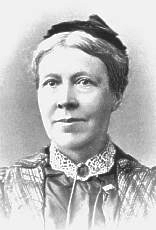Reform of women's higher education
The first stage in the reform of women's higher education took place between 1859 and 1870. The earliest moves came not surprisingly from within the middle class Protestant community in Belfast and Dublin, influenced by the new reform movement in women's higher education in England.
The three women particularly associated with this early stage were:
Mrs Byers who opened the Ladies' Collegiate School, Belfast in 1859
Anne Jellicoe who founded the Queen's Institute, Dublin in 1861 and Alexandra College, Dublin in 1866
Isabella Tod who established the Ladies' Institute, Belfast in 1867.

Mrs Byers
Courtesy Victoria
College, Belfast |

Anne Jellicoe
Courtesy Alexandra
College, Dublin |

Isabella Tod
Courtesy Museums &
Galleries of
Northern Ireland |
All three women relied on help from university professors who lectured part-time in these establishments. However, the low level of education among the students made it difficult to raise standards. Under pressure from these women, both Queen's College, Belfast, and Trinity College, Dublin, agreed to special examinations for women in 1870 but awarded only Certificates of Knowledge. These were of limited use to girls becoming governesses, but no substitute for university degrees.
The second stage in the reform of women's higher education took place between 1879 and 1910. It began with the passing of the Royal University of Ireland Act in 1879. University degrees were now open to women in Ireland for the first time. The Royal University of Ireland was set up as an examining Board on the same lines as the Intermediate Education Board of the previous year. Although women were now in theory admitted 'to all degrees, awards and prizes equally with men', the reality was very different.
- Unlike the English situation, none of the existing university colleges allowed women to attend lectures, except the Royal College of Surgeons. All of the twenty-eight university fellows appointed by the senate of the Royal University of Ireland lectured and examined in the existing men's colleges. This meant that women had to seek and pay for their university teaching either privately through grinders or through the various schools and colleges.
- The fact that the Intermediate Education Act (1878) and Royal University of Ireland Act (1879) were passed within a year of each other was another factor militating against women taking University degrees. It took some ten to fifteen years for the Intermediate Examination system to bring about the necessary reforms in girls' schools to enable them to enter for university examinations.
- All of the women's colleges in Ireland were handicapped in varying degrees by the lack of any endowment, the high cost of providing university classes for the small numbers involved and their dependence on the Royal University of Ireland. Almost all of them developed out of existing girls' secondary schools. The exception was Alexandra College, Dublin, which from its foundation in 1866, was based on Queen's College, London. Its school, Alexandra School, was not established until 1873, although by the 1880s it too was providing the finances which kept Alexandra College going.
Questions
- Name the three women most particularly associated with the first moves to raise the standard of women's higher education.
- List three problems encountered by Mrs Byers, Anne Jellicoe and Isabella Tod in their efforts to raise the standard of women's higher education in the mid nineteenth century.
- University degrees were not open to women in Ireland until the passing of the ____ _______ __ _____ Act in the year _____.
- Briefly state the problems which still existed for women in Ireland who wished to proceed to university degrees between 1879 and 1910.
Activities
- Research any one of the following: Mrs Byers, Anne Jellicoe, Isabella Tod, Alice Oldham, Henrietta White.
- Research any one of the following: Ladies' Collegiate School, Belfast; Alexandra College, Dublin; Ladies' Institute, Belfast.
The photograph of Isabella Tod is reproduced with the kind permission of the Museums and Galleries of Northern Ireland.





